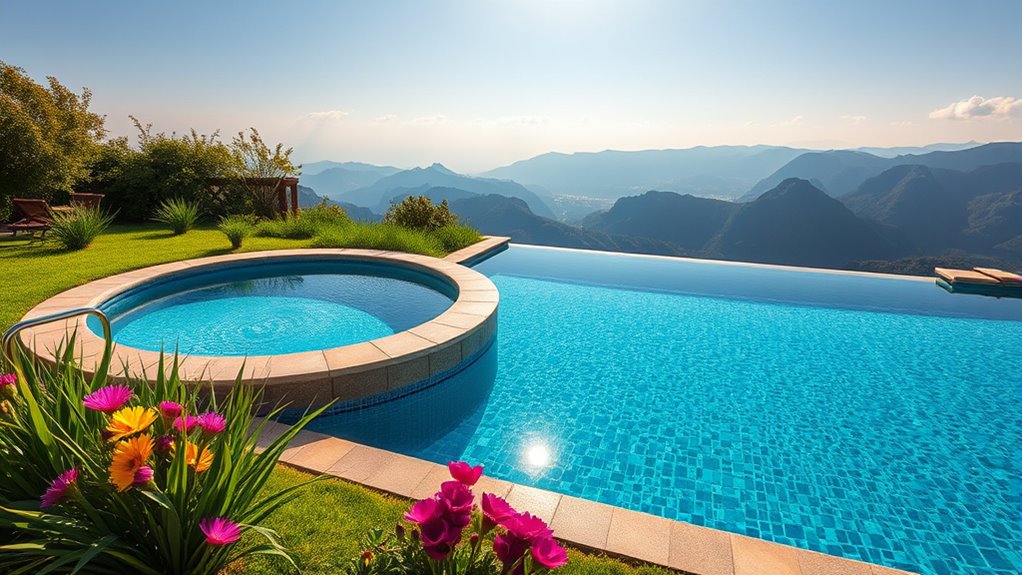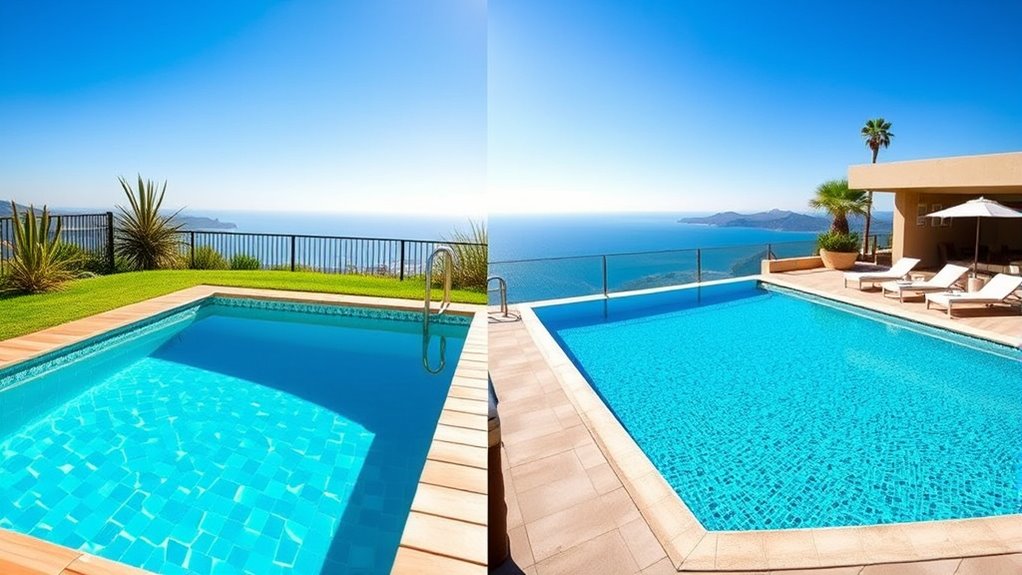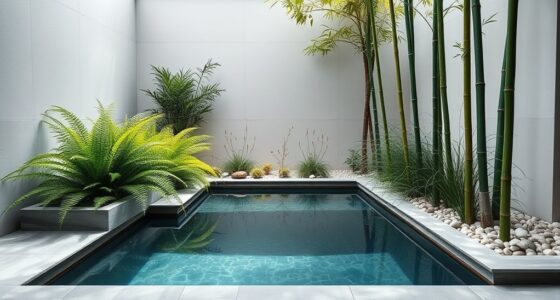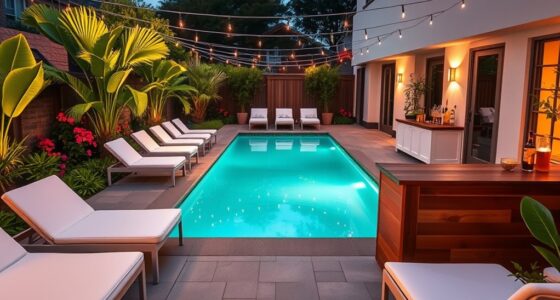Choosing between a small and large pool depends on your yard space, budget, and how often you want to use it. Small pools are budget-friendly, easier to maintain, and fit into tight spaces, making them ideal for relaxing and cooling off. Large pools offer more room for swimming, entertaining, and active fun but come with higher costs and upkeep. To find the best fit for your lifestyle and outdoor layout, explore the details ahead.
Key Takeaways
- Small pools are budget-friendly, easier to maintain, and ideal for compact yards and casual use.
- Large pools offer more space for swimming, entertaining, and active recreation but come with higher costs and maintenance.
- Yard size and outdoor layout influence the suitability of small or large pools for your property.
- Consider your intended use—relaxation vs. active swimming—to determine the ideal pool size.
- Overall, choose a pool size that balances your budget, maintenance capacity, and outdoor space availability.

When choosing a swimming pool, size is one of the most important factors to consider. A small pool might fit comfortably into a compact backyard, while a large pool offers more space for swimming and entertaining. But beyond aesthetics, you should consider how size impacts cost efficiency and maintenance requirements. Smaller pools generally cost less upfront and are more budget-friendly to operate. They use fewer materials during installation, which reduces your initial investment. Additionally, they consume less water and energy to heat, filter, and maintain, making them more cost-efficient over time. If you’re mindful of your budget, a small pool could be the smarter choice.
On the other hand, large pools tend to have higher costs associated with installation and ongoing maintenance. They require more extensive excavation, more liner or surface area, and larger filtration systems, all of which drive up initial expenses. Maintenance-wise, larger pools demand more time and effort to keep clean. They require more chemicals, longer filtration cycles, and more frequent cleaning to prevent algae buildup and debris accumulation. If you’re someone who prefers a low-maintenance setup or doesn’t want to spend extra hours on upkeep, a large pool might not be ideal unless you’re prepared to hire professional services.
Size also influences how often you’ll need to perform maintenance tasks. Smaller pools, with their limited surface area and volume, are easier to keep pristine. Skimming and cleaning are quicker, and balancing water chemistry is simpler because there’s less water to treat. Conversely, large pools require more diligent upkeep, which can be time-consuming and costly. If you’re someone who enjoys the convenience of fewer maintenance chores, a smaller pool offers a practical advantage.
Furthermore, the available space in your yard can significantly influence your decision, as it determines what size pool can comfortably fit without compromising other outdoor features. However, a large pool provides more versatility for swimming laps, hosting parties, or playing games, which might justify the higher costs and maintenance effort if you have the space and budget. A small pool is ideal if your main goal is relaxation, cooling off, or occasional dips without the hassle of extensive upkeep. Ultimately, your choice depends on your lifestyle, budget, and how much time you’re willing to dedicate to maintenance. Remember, a smaller pool can be just as enjoyable with less hassle and expense, while a larger pool offers more room for activity but demands a bigger commitment in terms of cost efficiency and upkeep.
Frequently Asked Questions
How Does Pool Size Affect Maintenance Costs?
Pool size directly impacts maintenance costs, as larger pools require more chemicals to maintain proper chemical balance and more water to be treated. You’ll also spend more on cleaning, filters, and energy. Smaller pools are easier and cheaper to maintain, often allowing for more affordable pool cover options. Ultimately, a larger pool involves higher ongoing costs, while a smaller pool offers simpler, more budget-friendly upkeep.
Can Small Pools Be Heated Efficiently?
Yes, small pools can be heated efficiently. You can improve heat retention by using good pool insulation, which minimizes heat loss. Additionally, choosing the right heating options, like solar heaters or heat pumps, makes a big difference. Smaller pools warm up faster and cost less to heat overall, so with proper insulation and efficient heating methods, you’ll enjoy a warm pool without high energy bills.
Are Large Pools More Energy-Efficient Than Small Ones?
A large pool can seem like a giant energy-eating monster, but it isn’t necessarily less efficient. While bigger pools may use more energy overall, they often benefit from better pool insulation, which enhances energy savings. Proper insulation helps maintain temperature, reducing heating costs regardless of size. So, your energy efficiency depends more on insulation quality than pool size. Focus on good insulation to keep costs down—big or small.
What Safety Features Are Recommended for Different Pool Sizes?
You should prioritize safety features like proper fencing and pool cover options, regardless of your pool size. For small pools, a secure fence prevents accidental falls, while larger pools benefit from barriers that restrict access. Always install a pool cover to keep debris out and prevent unsupervised access. Check local fencing requirements to guarantee compliance, and consider safety alarms for added protection, making your pool a safer space for everyone.
How Does Pool Size Influence Property Value?
Pool size can considerably influence your property value, as larger pools enhance yard aesthetics and create a luxurious vibe. However, bigger pools often involve construction challenges, higher maintenance costs, and may not suit smaller yards. A well-designed pool that complements your home’s style boosts curb appeal and resale value. Consider your space and budget to choose the right size, balancing visual appeal with practical considerations for maximum property benefit.
Conclusion
Choosing between a small and large pool is like deciding whether to swim in a cozy pond or a vast ocean. Think of a small pool as your personal oasis—intimate and easy to maintain—while a large pool offers endless space for fun and relaxation. Picture yourself gliding through crystal-clear water, feeling the difference in size and scope. Whichever you pick, make sure it aligns with your lifestyle, so your backyard becomes the perfect escape.









